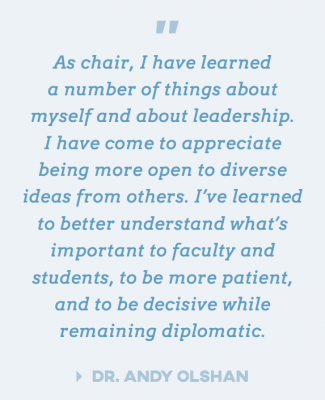Andrew Olshan, PhD
October 15, 2017
Andrew Olshan, PhD
Barbara Sorenson Hulka Distinguished Professor in Cancer Epidemiology
Chair, Epidemiology
Associate director of population sciences, UNC Lineberger Comprehensive Cancer Center
Q: What do you tell your students about how to prepare to be leaders in public health?
A: Of course, students have to be well- grounded in the fundamentals of their disciplinary areas (e.g., epidemiology) and public health more broadly. I tell them to embrace all aspects of their graduate training as many of these experiences will not only make their training richer (and fun), but also will build skills for future success, including leadership roles. For example, I encourage and help support students’ engagement as part of teams, working with faculty, staff and other students.
In these settings, it’s important that students be given leadership roles to better learn effective leadership through communication, goal-setting and working with others. Learning teamwork and seeing first-hand examples of good leadership are essential to being a successful public health scientist and leader.
Being engaged in research or other work that leads to encounters with study participants, community members and others outside of academia is also critical to a student’s full appreciation of the impact of public health and the needs and perspectives of the public.
Finally, I encourage the development of “soft skills,” such as time management, organization and giving presentations to both scientific and lay audiences as an important part of developing mastery of a subject area and gaining confidence.
Q: How has your approach to leadership changed since you became a chair at the Gillings School?
 A: In the past 11 years as chair, I have learned a number of things about myself and about leadership. Over time, I have come to appreciate being more open to diverse ideas from others. I’ve learned to better understand what’s important to faculty and students, to be more patient, and to be decisive while remaining diplomatic.
A: In the past 11 years as chair, I have learned a number of things about myself and about leadership. Over time, I have come to appreciate being more open to diverse ideas from others. I’ve learned to better understand what’s important to faculty and students, to be more patient, and to be decisive while remaining diplomatic.
I have learned much from working with and observing leaders in the School and elsewhere on campus – for example, the need to build a relationship with a wide network of leaders and faculty members, understand their niche areas and resources, and be able to draw on this knowledge to build collaborations, implement strategic initiatives, and increase the probability of new bridges for the department and School.
Q: What characteristics are most important in public health leaders today?
A: First, remain optimistic! There is much uncertainty about federal funding and support for public health and health-related research more broadly. However, given the cyclic nature of politics and other factors, leaders must remain steadfast that the absolutely critical importance of public health will prevail, as it always has. Today’s leaders must be even more flexible and willing to take risks. Science and technology continue to evolve rapidly, and public health not only has to stay abreast of these developments, but also to be effective in evaluating and implementing relevant advances.
The speed of change is greater than ever, and leaders must be especially adroit at understanding change and its importance to public health. This speaks to the importance of collaboration. Although the concept of team science has had a high profile for at least a decade, the relevance of working across boundaries is essential. Leaders will have to understand how to work effectively in this interdisciplinary environment and how to develop structures, training and a culture that fully leverages it.
Academic leadership is quite challenging for many reasons. However, service through leadership can be especially gratifying as one provides support for such an important endeavor as public health.
Carolina Public Health is a publication of the University of North Carolina at Chapel Hill Gillings School of Global Public Health. To view previous issues, please visit sph.unc.edu/cph.
